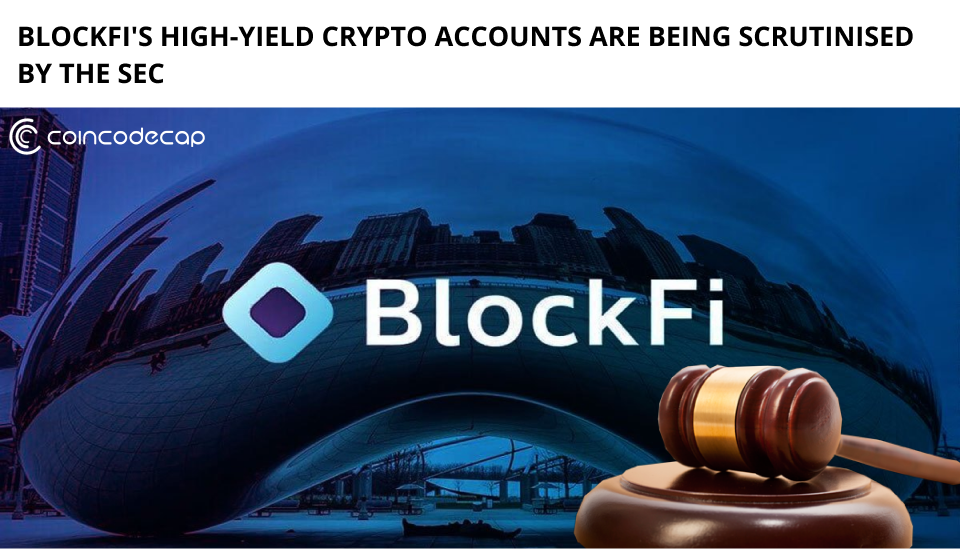Key Takeaways:
- BlockFi’s high-yield crypto accounts are under scrutiny by the SEC, which pays customers high-interest rates for lending out their digital tokens.
- According to SEC Chair Gary Gensler, many enterprises in the industry are selling things that should be registered with the agency, bringing them under tighter monitoring and limits.
The Securities and Exchange Commission is looking into BlockFi Inc.’s popular product, which pays consumers hefty interest rates for lending out their digital tokens. This development adds to the fast-growing crypto firm’s legal difficulties.
The SEC’s investigation is focused on whether BlockFi accounts are securities that should be registered with the agency. The Jersey City, a New Jersey-based company, advertises yearly rates as high as 9.5%, less than the 0.06% average interest rate for bank savings accounts. New Jersey and Texas have previously initiated legal action against BlockFi, alleging that the company is selling unlawful financial products that lack essential consumer safeguards.
The United States Securities and Exchange Commission (SEC) is a significant independent federal body established after the 1929 Wall Street Crash. The SEC’s primary goal is to ensure that the legislation prohibiting market manipulation is followed.
BlockFi and other organizations may pay high-interest rates because they can charge institutional investors for access to cryptocurrencies. With businesses claiming to have received more than $40 billion in deposits, the industry is one of the hottest sections of the market.
BlockFi isn’t the only company that has provided investors with massively high returns. They invested in Defi platforms and staked coins to earn money to assist in the upkeep of a coin’s network.
BlockFi, a private corporation with over 500,000 retail clients, has a more than $4 billion market capitalization. The business offers clients a wide range of financial services, including trading accounts and loans that allow consumers to borrow money against their virtual tokens. It is backed by Wall Street giants like Tiger Global Management and Bain Capital. BlockFi has not been charged with any misconduct by the SEC, and not all agency inquiries result in enforcement actions.
Spokespeople for BlockFi and the SEC declined to comment.

What exactly is cryptocurrency lending, and why are authorities interested in it?
In a speaking engagement, SEC Chair Gary Gensler has claimed that he believes many businesses in the industry are selling items that should be registered with the agency, putting them under stricter control and restrictions. According to the SEC, when consumers invest their money “in a common enterprise” with the expectation of profit, they engage in an investment contract over which the regulator has jurisdiction. So when Coinbase Global Inc. revealed in September that the SEC had threatened to prosecute it if it followed forward with a plan to pay users 4% for lending, the sector was alerted to the SEC’s tough stance.
Since coming into office in April, Gensler has invited companies who provide crypto-lending products to meet with the agency to discuss how they should be regulated. Simultaneously, the SEC has been quietly preparing the framework for a crackdown.
The SEC’s expectations vary, but they are frequently centered on whether items are subject to its control. For example, according to one individual who requested not to be identified because the request was confidential, agency enforcement attorneys recently asked some DeFi platforms to explain how their assets aren’t securities in response to a subpoena.
State inspection:
State securities officials have also begun an investigation into crypto-lending companies, including BlockFi. New Jersey’s Bureau of Securities ordered BlockFi to cease providing its accounts in July, with the order’s effective date extended to December. Kentucky followed suit, while authorities in Texas, Alabama, and Vermont asked BlockFi to show why its loan product should not be banned in their jurisdictions. Unlike bank deposits, crypto accounts are not guaranteed by the federal government is a significant worry. As a result, customers may lose money if a company goes bankrupt.
In August, J. Christopher Giancarlo, the former chairman of the Commodity Futures Trading Commission, quit BlockFi’s board amid a regulatory investigation. Giancarlo, who works as a consultant for the business, remained silent.
Despite the escalating legal concerns, BlockFi is rapidly expanding. According to one of the company’s founders, Zac Prince, the company is on track to generate $475 million in gross sales this year. Moreover, during a recent interview at the Bloomberg Financial Innovation Summit on November 5 that things aren’t slowing down.









